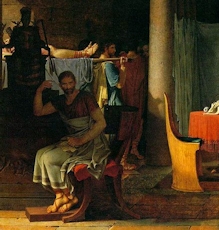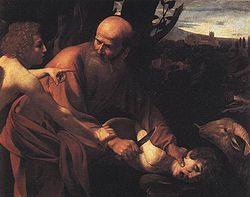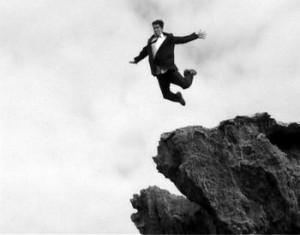Barth and Kierkegaard may each in his own way be seen as voices of resistance against the trends inherent in the liberal theology of their respective milieus. In Fear and Trembling[1], we see Kierkegaard's protest against the totalizing philosophy of the Hegelians. Some 75 years later Barth's Epistle to the Romans[2] would cite Kierkegaard's "leap of faith" in Barth's own objection to the comfortable way in which God had been brought to the level of an object within the realm of human understanding. Both authors reject what might be referred to as "mediation," or rational explanations of encounters between human beings and God.
 Writing under the pseudonym Johannes de Silentio, Kierkegaard published Fear and Trembling in 1843 during a time when Hegelianism was fashionable among the intelligentsia of Copenhagen.
Writing under the pseudonym Johannes de Silentio, Kierkegaard published Fear and Trembling in 1843 during a time when Hegelianism was fashionable among the intelligentsia of Copenhagen.
Silentio makes indirect reference to the system in his preface as he reflects on those who are no longer willing to content themselves with mere faith, but instead attempt to go further.
Silentio further remarks that even if a person succeeds in transposing the content of faith into conceptual form, he will not necessarily comprehend "how he entered into it or how it entered into him" (FT III.59, 7). Silentio's comments are a criticism of the Hegelian dialectic's attempt to extract from faith its underdeveloped sense of spirit evolving in history.
To illustrate his point about faith, Silentio uses the story of Abraham's response to God's command to sacrifice Isaac as a vehicle for exploring what he variously refers to as a paradox, the absurd, the absolute, or a leap of faith. Abraham is ordered by God to sacrifice his son, Isaac. But the conditions under which Abraham chooses to fulfill God's command make him an anomaly to the Hegelian system.
 Slientio offers examples of several characters who have killed their offspring: Agamemnon, Jephthah, and Junius Brutus (FT III.108, 58).
Slientio offers examples of several characters who have killed their offspring: Agamemnon, Jephthah, and Junius Brutus (FT III.108, 58).
In each of these cases a reasoned explanation is commonly accepted for their actions: that the Greeks might when the Trojan War, that the Israelites might defeat the Ammonites, and that the state might be preserved against Brutus's sons who were plotting a coup respectively.
The sacrifice of each parent's child(ren) is justified as the ethical choice, contributing to the greater good. Thus, the fathers fall into a category Silentio refers to as the "knight of infinite resignation." As a tragic figure, this hero resigns himself to personal sacrifice that aligns with the ideal of the Hegelian universal (FT III.104, 54).
Abraham, however, falls into a completely different category. His intention to sacrifice Isaac is only out of obedience to God's command. Abraham chooses to carry out his task in silence, concealing his intentions from his wife, his servant, and even from Isaac. Silentio labels Abraham as a "knight of faith" who looks very much like the "knight of infinite resignation," but has undergone what he refers to as the double movement: infinite resignation, followed by a leap of faith. Against all logic, Abraham hopes that God will give back to him that which he has freely chosen to sacrifice. Because the word comes from God it is Abraham's absolute duty to comply, yet to do so looks like murder to anyone observing from the side.
Silentio suggests that Abraham's situation represents a paradox. His actions place him as an individual above the universal because he follows God's command, but cannot be seen as doing it for any reason reserved for the tragic hero (there's no "ethical" payoff). But at the same time, he is bound to silence because if he explains himself he enters into mediation, which Silentio tells us is the same thing as the universal (FT III.30, 82).
In Hegel's philosophy, the universal is achieved by working out a dialectical movement between two opposing positions, sublating them into something greater. All of this takes place with the use of language. Therefore, if Abraham opens his mouth to offer any explanation for what he is about to do, he joins himself to the dialectic.[3] He no longer stands on faith alone, but on the explanation that he has provided and within the universal.
 Only two ways are open to Abraham if he wishes to stand in faith. He must either remain silent, or as when asked by Isaac about the sacrifice, he must offer up what Silentio characterizes as irony. By answering that God will provide for his sacrifice, Abraham does not succumb to the dialectic, but rather offers a nonsensical statement which cannot be sublated into the universal (FT III.164, 118).
Only two ways are open to Abraham if he wishes to stand in faith. He must either remain silent, or as when asked by Isaac about the sacrifice, he must offer up what Silentio characterizes as irony. By answering that God will provide for his sacrifice, Abraham does not succumb to the dialectic, but rather offers a nonsensical statement which cannot be sublated into the universal (FT III.164, 118).
Barth too is aware of the mediating influence of language and the power it has to remove us from the realm of faith. For him, the primary issue was one of presumption on the part of Christians who had grown quite comfortable in their ideas about God. "In speaking of God," he tells us, "human logic characteristically ignores both His nature and the fact that, when the reference is to Him, the argument from operation to cause is inapplicable, since He is not a known thing in a series of things" (ER 82).
Barth insists that God is wholly other, beyond any human conception. He includes in this any "other-worldliness … thought of merely as improved worldliness, all improper notions of immanence, every non-radical idea of transcendence, every kind of relation between God and man, every divinity which presents itself as being or having or doing what men are or have or do, every human figure which calls itself in any way divine" (ER 108).
For Barth, the gap between the divine and humanity is an infinite chasm. Any attempt to define God in terms of our own concepts is doomed to failure. What we need is revelation which comes from God's side.
 This revelation, which comes to us in the form of Jesus' resurrection, is compared to a bomb exploding, leaving behind a crater of negative space – a gap between itself and the world.
This revelation, which comes to us in the form of Jesus' resurrection, is compared to a bomb exploding, leaving behind a crater of negative space – a gap between itself and the world.
Once Jesus Christ has opened up the gap, he fills it with revelation from the other side: "We stand here before an irresistible and all-embracing dissolution of the world of time and things and men, before a penetrating and ultimate KRISIS, before the supremacy of a negation by which all existence is rolled up" (ER 91).
Before such an inbreaking, Barth is left with only paradoxical language to point to the ineffable: "…time which is beyond time… space which has no locality… impossible possibility…" This is the "gospel of transformation… the imminent Coming of the Kingdom of God… salvation in the world… acquittal in condemnation… eternity in time… life in death." All of these things are what Barth refers to as "affirmation in negation" (ER 92).
Barth further characterizes God as "pure negation," which encompasses and transcends polar dichotomies such as here/there, life/death, and existence/nonexistence (ER 141-142). What is revealed in Jesus' resurrection transcends all the categories of language, even to the point of negating the language that Barth uses to describe it.
Barth and Kierkegaard share a distrust of language as mediator of the encounter with the Divine. While for Kierkegaard it forces Abraham into silence, for Barth it forces the sort of dialectical movement in which he claims we cannot talk about God, but is then forced to attempt to talk about God, only to then negate all the claims he has just asserted.
Barth resorts to the image of the inbreaking righteousness of God as "our standing-place in the air," a place where there is no human possibility of standing, "whose foundations are laid by God Himself and supported always by Him only…" (ER 94)
 Alluding to Kierkegaard, Barth tells us, "There is no such thing as mature and assured possession of faith: regarded psychologically, it is always a leap into the darkness of the unknown, a flight into empty air" (ER 98).
Alluding to Kierkegaard, Barth tells us, "There is no such thing as mature and assured possession of faith: regarded psychologically, it is always a leap into the darkness of the unknown, a flight into empty air" (ER 98).
In some sense what we learn from the comparison is the limitation of a sheer silence.
Abraham may be Kierkegaard's exemplar; however, as a systematic theologian, Barth cannot simply hold silence or make ironic, nonsensical statements. Presented with a whiteboard and pens, Kierkegaard's Abraham must stare at the board in silence, or at best make some random, unintelligible squiggles.[4] For Barth, it seems we must attempt to write, but then erase our notes from the board lest we be tempted to look into our scrawlings and claim to have discerned God.
[1] Citations refer to Søren Kierkegaard, Howard V. Hong, and Edna H. Hong, Fear and Trembling; Repetition, Kierkegaard's writings (Princeton, N.J.: Princeton University Press, 1983).
[2] Barth citations in this essay refer to The Epistle to the Romans, (New York: Oxford UP, 1968).
[3] For this understanding I am indebted to the SparkNotes Editors, "SparkNote on Fear and Trembling," http://www.sparknotes.com/philosophy/feartrembling/.
[4] An irony in itself considering the prolific nature of Kierkegaard's own writings.
Compare Barth and Kierkegaard’s criticisms of “mediation.” What motivates their accounts? To what extent do their motivations—and the content of their accounts—converge? What, if anything, can we learn from this comparison?



